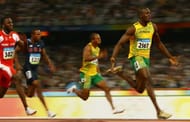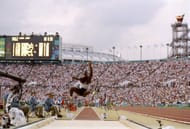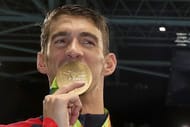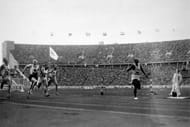Ask any athlete what their ultimate career dream is and I bet you the reply would be winning an Olympic gold medal. The Olympics is the mecca of sports and every athlete on this planet wants to be a part of the biggest sports extravaganza on offer.
The Olympics is not only a huge event for the athletes but also for the fans as they get to watch some of the best athletes compete against each other for the most coveted prize in sports.
There have always been athletes at the Olympics who have put on a show for the fans and owned the games, hence sparks fly whenever the discussion about the greatest Olympian arises.
So, to simplify the matter, here we put forward five of the greatest athletes ever to grace the Summer Olympics:
#5 Usain Bolt (Athletics, Jamaica):

Some prerace clowning, a finger to the sky, head bowed beneath the shoulders, a slow start, a blinding finish and a now world-renowned pose. These are the few things that people in the stadium or in front of the television became accustomed to whenever they saw the greatest sprinter take the track.
As the speakers in the Bird's Nest Stadium blasted out the names of the sprinters taking part in the 100 m final, in lane 4, a young 22-year-old boy in the black and green of Jamaica kneeled down in start position as silence endured for the start of the race. In a field consisting of Asafa Powell and Richard Thompson, a Usain Bolt gold was a far fetched thought but on August 16, 2008, as hundreds of cameras flashed around one of the greatest stadiums in modern Olympics for athletics premier event, bang went the gun and in the blink of an eye the 6'5" Jamaican obliterated the world record with a time of 9.69 seconds, the world watched in awe as something special unfolded in front of them.
Bolt continued in the same vein for the 200 m race where he smashed the world record with a 19.19-second run to claim his second gold. He bought his successful 2008 Olympics to an end by breaking the 4 x 100 m world record with the Jamaican team.
Bolt was a breath of fresh air in a sport marred by doping fails to some of the biggest names in Justin Gatlin and Konstantinos Kenteris to name a few. The sport needed a savior and Bolt looked like someone it could bank on for the coming future.
When Bolt landed in London for the 2012 Olympics his throne was under attack by his very own up and coming countryman Yohan Blake who had got the better of him at the Jamaican Olympic trials in both the 100 m and 200 m. People doubted Bolt's ability to defend his Olympic title.
Bolt answered his doubters in style with a gold in the 100m in a record Olympics timing of 9.63 seconds, a full 0.12 seconds ahead of the silver medalist Yohan Blake. In the 200 m, he continued from where he left off in 100 m as he missed the Olympic record time by 0.02 s with a gold-winning time of 19.32 s over half a second faster than bronze medalist Warren Weir. Bolt was the first sprinter in Olympic history to defend his titles.
In his final Olympic Games, at the 2016 Rio Olympics, Bolt was looking to cement his status as a sprinting legend. He left in no one in doubt of his legendary status with a clean sweep in the 100 m, 200 m and 4 x 100 m events finishing with 9 gold medals in his entire Olympic career, unfortunately, he had to give one away due to Nesta Carter's dope fail in the 2008 Olympics.
Even though Bolt may not have double-digit medals to show for at the end of his Olympic career, his mere charismatic presence along with his record-breaking performances made him a global superstar. His playful and unpredictable antics whether it was clowning around with mascots or discussing his pre-race McDonald's diet, Bolt never failed to entertain. Every time he sat on the blocks, people around the world sat with tantalizing anticipation that something special might be up the corner.
Bolt is once in a generation athlete and the Olympic games and the people around the world are privileged to have been a spectator to one of the greatest athletes and Olympians to have ever graced the track.
#4 Carl Lewis (Athletics, USA):

It is enough to tell that a person is freak of nature when he gets drafted by the Chicago Bulls and the Dallas Cowboys in the same year even though he has played neither basketball or football during his college days. While he never represented either of them, Carl Lewis made a name for himself on the biggest stage of all, the Olympic Games. He won 10 medals including 9 gold across 4 summer games breaking countless records along the way.
An explosive athlete from a very young age, Lewis made it to the 1980 American Olympic team for the long jump and the 4 x 100 m relay events. But, the Olympic boycott precluded Lewis from competing in Moscow.
His next opportunity came in the 1984 Summer games in Los Angeles, where he represented the USA in the 100 m, 200 m, 4 x 100 m relays and the long jump. Lewis entered all 4 events with a realistic chance of winning and emulating Jesse Owens 4-gold performance from the 1936 Berlin games.
He started off with a bang winning the 100 m with a time of 9.99 s, in his next event the long jump, his first attempt of 8.94m was enough to earn him the gold medal. Lewis continued his rich vein of form and captured the 200 m title with an Olympic record time of 19.80 s, in his final event the 4 x 100 m relay, Lewis ran the anchor and chested the tape at 37.83 s, setting a new world record and matching Owen's record haul.
In Lewis's second games, the 1988 summer Olympics in Seoul, he was part of the infamous 100 m race in which Ben Johnson broke the world record with a time of 9.79 seconds but was stripped of the medal after he tested positive for steroids, the medal was therefore awarded to second-placed Lewis who had a time of 9.92 s.
In the long jump event, Lewis leaped for 8.72 m in his 4th attempt which eventually proved enough for the gold medal. That was his final gold medal in that games as he could manage only a silver in the 200 m while his team failed to qualify for the 4 x 100 m relay finals.
Soon, as age and form eventually caught up with Lewis he failed to qualify for the 100 m and 200 m events at the 1992 Barcelona games but still managed to sneak through for the long jump and 4 x 100 m relay event.
Lewis continued his dominance in the long jump, with a jump of 8.67 m in his first attempt he secured a gold medal for a 3rd consecutive time. He even managed to put the disappointment from his failure to qualify for the 4 x 100 m final from the last Olympics behind to win the relay event in a world record time of 37.40 s.
In 1996, at the Atlanta Olympics, Lewis took part in only one event: the long jump, a pet event of his for the past 3 games, Lewis did not break a sweat as his third attempt of 8.50 m was enough to earn him the gold medal, making him just the 3rd athlete in Olympic history at that time to win the gold medal at a single event for 4 consecutive times.
Lewis finished his Olympic career with 10 medals of which 9 were gold medals, a feat no track and field athlete has bettered, he was the only athlete ever to successfully defend his Olympic long jump title. In 1999, Lewis was voted by the IOC as the 'Sportsman of the century'.
#3 Larisa Latynina (Gymnastics, Soviet Union

Success stories on any level always contain a combination of dedication, hard work and a little bit of luck. Larisa Latynina received the latter very early when at the age of 11, aspiring to be a ballet dancer she was redirected by her teachers towards gymnastics, a sport that would define her in the coming future.
Larisa participated in her first games at the 1956 Summer Olympics in Melbourne, this was where her great medal hunt began in glorious fashion. She locked horns with Agnes Keleti, a Hungarian gymnast, who was on par with her talent wise.
Larisa managed to get the better of Agnes on 3 occasions in the individual all-around, vault and team all around but she had to share the floor exercise gold with her. She also won a silver in uneven bars and a bronze in the now defunct team event with portable apparatus. Overall, Larisa finished with a haul of 4 gold, 1 silver and 1 bronze medal in her debut appearance at the Olympics.
4 years later, Larisa entered her second Olympic games as a favorite and she did not disappoint defending her Olympic titles in the all round team, individual all round and floor exercise events. She had to settle for silver in the balance beam and uneven bars and also a bronze in the vault. Larisa added 3 gold, 2 silver, and a bronze to her medals tally from 1956 and bumped up her overall tally to 12 medals.
Participating as the defending world champion in her final Summer Games at the 1964 edition in Tokyo, Larisa added 2 more gold medals to her kitty by winning the team event and floor event for the third time in a row. She had to content with 2 silver and 2 bronze in her remaining events. Larisa finished with 18 medals overall in a glorifying Olympic career spanning across 3 games.
Her overall gold medal tally of 9 is the most by any female athlete in the history of the Summer Games. She is tied 2nd for the most gold medals ever won by an athlete at the Olympic Games. Larisa held the distinction of having most medals in the history of the Olympic Games for 48 long years before Michael Phelps eclipsed her in 2012. She is also an inductee in the International Gymnastics Hall of Fame.
#2 Michael Phelps (Swimming, USA):

Swimming turns into an absolute monster during the Olympics as compared to during other international meets. Many swimmers have tried to tame the waters but have crushed under the pressure, it needed a special someone to master the water and make it its own pet. In came a lanky American with a wide-grinned smile who across 5 Summer Games became one of the greatest ever athlete to step into the pool, a man who became synonymous with the Olympics, a man who we soon came to know as Michael Phelps.
Phelps had his first taste of Olympics at the 2000 Summer Games in Sydney where, as a 15-year-old he became the youngest ever male swimmer to make it to the USA Olympic team in 68 years. He did not win a medal but made it to the 200 m butterfly finals where he finished a respectable 5th.
Fast-forward 4 years, Phelps is no pushover teenage swimmer anymore, he is the holder of 5 world records and is one of USA's top swimmers coming into Athens.
Phelps started off with a bang winning his first event the 400 m individual medley in a world record time of 4:08.26 s, he followed that up with a bronze in the 4 x 100 m freestyle relay. In the 200 m race titled the 'Race of the Century' Phelps faced off against Ian Thorpe but could manage only a bronze with a time of 1:45.32 setting a new national record. Phelps destroyed the field in his next 5 races as he claimed 5 gold medals, set 2 World records and 3 Olympic records for the second-best performance ever by an athlete at a single Olympics.
After an incredible performance in Athens, Phelps came to Beijing chasing Spitz's record of 7 gold medals in a single Olympics. He started off in spectacular fashion winning the 400 m individual medley in a world record time of 4:03.84 s. This was just the start as Phelps raced off to 7 more gold medals setting world records in all but one as he broke Mark Spitz's long-standing record of most gold medals in a single Olympics by winning 8.
At the London Olympics in 2012, Phelps was not just a swimmer anymore he was the legend that crowds swamped in huge numbers to watch as he broke one record after another. Expecting a repeat performance from the 2008 Olympics was asking a bit too much from even Phelps himself.
But Phelps still managed to win 4 gold medals and 2 silver medals even after finishing 4th in the 400 m individual medley, the first time Phelps had failed to win a medal at the Olympics since the 2000 Sydney games. Phelps gold medal in 4 x 200 m freestyle relay helped him surpass Larisa Latynina for the all-time record for most medals won at the Olympic Games.
Phelps announced his retired from competitive swimming after the 2012 Olympics but later returned back from retirement in 2014.
Phelps came to the 2016 Rio Olympics for the swansong of his Olympic career. Even at the age of 31, Phelps hunger for gold had not died as he raced to 5 gold medals and 1 silver medal while setting an Olympic record time in the 4 x 100 m medley.
Phelps total medals tally is greater than what most countries can even boast of combined. He is one of the greatest athletes ever to grace the Olympics and fans around the world should feel privileged to have watched one of the best in action for over 5 games.
#1 Jesse Owens (Athletics, USA):

As athletes from around the globe arrived in Berlin for the 1936 Olympic Games, Hitler had planned to show them and the world that the Aryan people were the most dominant race of all. But unfortunately for him and the Nazi party, an African-American athlete named Jesse Owens arriving on the SS Manhattan had a different plan for the games.
A product of the Ohio State University athletics team, Owens initially took part in the 100 m, 200 m, and long jump events but at the last minute was called up for the 4 x 100 m relay event in a controversial decision which even now is widely criticized.
Owens first event in the 1936 Berlin Games was the 100 m dash which he narrowly won with a time of 10.3 s about a tenth of a second faster than silver medalist Ralph Metcalfe. His next event was the long jump where he was the world record holder, during the qualifying rounds Owens fouled in his first 2 jumps and required a jump of over 7.15 m to qualify for the finals. This was when one of the most iconic and puzzling events in Olympic history took place, Luz Long, a German athlete, walked up to Owens and gave him some technical advice how to jump his final attempt, the advice worked wonders as Owens easily crossed the qualifying mark to enter the finals of the long jump.
In the finals, both Owens and Long went neck and neck exceeding the then Olympic record 5 times before Owens finally came out trumps with a jump of 8.06 m. In his third and final event the 200 m sprint, Owens coasted to the finish line with a time of 20.7 s about 0.4 s ahead of his nearest competitor.
The 200 m sprint was meant to be Owens final event at the games but on August 9, 1936, he along with Metcalfe were mysteriously included into the 4 x 100 m relay final race replacing 2 of the Jewish teammates. Owens protested the exclusion of his teammates but ultimately took part in the final and set a new world record with a time of 39.8 s for his 4th gold medal.
A prestigious sporting event hoped by the Nazi to be a showcase of Aryan supremacy were quashed by Owens and his 4-gold performance, a feat later eclipsed by Carl Lewis in 1984. The American's flying performance in the long jump and his record wins in the 100 m, 200 m and 4 x 100 m relay events put to lie the Fuhrer simplistic myths about race.
Owens performance at the 1936 games was so historic that the dormitory he used during the games has been fully restored into a living museum, with pictures of his accomplishments from the games on display.
